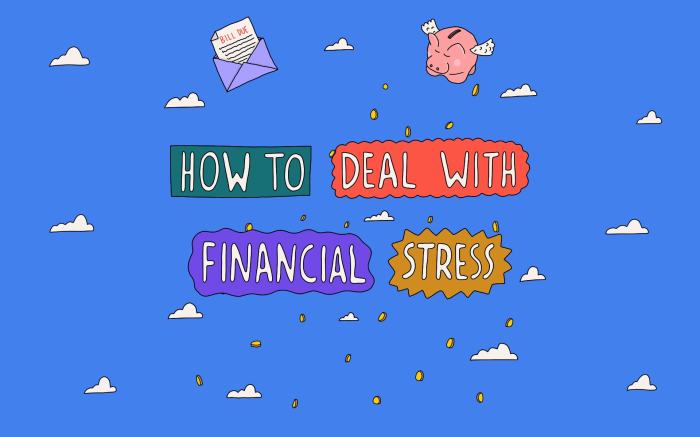Exploring the realm of financial stress management, this article delves into the impact of financial stress on mental health, common causes, and effective strategies for alleviating the burden. From creating budgets to seeking professional help, discover practical tips to navigate through financial challenges.
Understanding Financial Stress
Financial stress is a condition that arises when an individual feels overwhelmed by their financial situation, leading to emotional and psychological strain. This type of stress can have a significant impact on mental health, contributing to anxiety, depression, and other related issues.
Impact on Mental Health
Financial stress can manifest in various ways, affecting mental health by increasing levels of stress hormones like cortisol, which can lead to chronic stress. This can further result in symptoms such as insomnia, mood swings, and difficulty concentrating. Over time, chronic financial stress can even contribute to more severe mental health conditions like depression and anxiety disorders.
Common Causes of Financial Stress
- High levels of debt: Accumulating debt beyond one’s means can create a constant state of worry and anxiety.
- Unemployment or underemployment: Losing a job or not earning enough to cover expenses can lead to financial instability and stress.
- Unexpected expenses: Sudden medical bills, home repairs, or other unforeseen costs can strain finances and cause stress.
- Lack of savings: Not having an emergency fund or savings buffer can leave individuals vulnerable to financial stress during tough times.
Strategies for Managing Financial Stress
Creating a budget and sticking to it is crucial in managing financial stress. A budget helps individuals track their expenses, prioritize their spending, and ensure they are not living beyond their means.
The Importance of Creating a Budget
Creating a budget involves listing all sources of income and expenses, categorizing spending, and setting limits for each category. By having a clear overview of their financial situation, individuals can make informed decisions and avoid impulsive purchases that may lead to financial strain.
The Benefits of Building an Emergency Fund
Building an emergency fund is essential for unexpected financial setbacks, such as medical emergencies or job loss. Having a financial cushion can alleviate stress and prevent individuals from going into debt to cover unforeseen expenses.
Tips for Reducing Debt
- Avoid taking on new debt and focus on paying off existing debts.
- Consider consolidating high-interest debts to lower overall interest payments.
- Explore debt repayment strategies, such as the snowball or avalanche method, to tackle debts systematically.
- Seek professional help from credit counselors or financial advisors to create a personalized debt repayment plan.
Seeking Professional Help

Seeking professional help from financial advisors, credit counseling services, or therapy/counseling can be crucial in managing financial stress effectively. These professionals offer specialized support and guidance to individuals facing financial difficulties, helping them navigate their challenges and develop sustainable solutions.
Role of Financial Advisors
Financial advisors play a key role in helping individuals manage their finances, including addressing financial stress. They provide personalized financial advice, create customized financial plans, and offer strategies to improve financial wellness. By analyzing a client’s financial situation, goals, and risk tolerance, financial advisors can help individuals make informed decisions to alleviate financial stress and work towards financial stability.
Benefits of Credit Counseling Services
Credit counseling services offer valuable assistance to individuals struggling with debt and financial challenges. These services provide debt management plans, budgeting advice, and negotiation with creditors to reduce interest rates or fees. By working with a credit counselor, individuals can gain a better understanding of their financial situation, develop a plan to repay debt, and improve their financial literacy skills. Credit counseling services can help individuals regain control over their finances and reduce the burden of financial stress.
Therapy or Counseling for Coping with Financial Stress
Therapy or counseling can be beneficial for individuals experiencing significant financial stress. Mental health professionals can help individuals address the emotional impact of financial difficulties, develop coping strategies, and improve their overall well-being. Through therapy, individuals can explore their beliefs and attitudes towards money, identify unhealthy financial behaviors, and learn effective ways to manage stress and anxiety related to finances. Therapy or counseling can provide individuals with the tools and support needed to navigate financial challenges and build resilience in the face of financial stress.
Lifestyle Changes for Stress Reduction
Living a minimalist lifestyle can significantly reduce financial burden by focusing on what truly matters and eliminating unnecessary expenses. By simplifying your life and possessions, you can free up mental and financial resources to cope with stress more effectively.
Impact of Regular Exercise and Healthy Eating
Regular exercise and healthy eating habits play a crucial role in managing financial stress. Exercise releases endorphins, which are natural mood lifters, helping to reduce anxiety and stress levels. Similarly, maintaining a balanced diet provides the necessary nutrients for your body to function optimally, enhancing your overall well-being and resilience to stress.
- Engage in physical activities like walking, jogging, or yoga to boost your mood and reduce stress.
- Plan and prepare healthy meals at home to save money and promote better health.
- Limit the consumption of processed foods and sugary drinks, as they can negatively impact your mood and energy levels.
Affordable Hobbies and Activities
Finding affordable hobbies and activities can be a great way to destress without breaking the bank. Engaging in activities that bring you joy and relaxation can help you unwind and refocus, reducing financial stress in the process.
- Explore free or low-cost hobbies such as reading, gardening, painting, or hiking to relax and recharge.
- Join community groups or clubs that offer inexpensive or no-cost activities, such as book clubs or volunteer organizations.
- Take advantage of local resources like libraries, parks, and community centers to discover new hobbies and interests without spending a lot of money.
